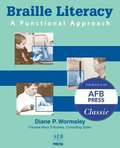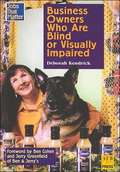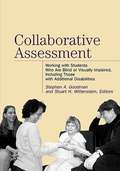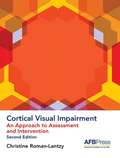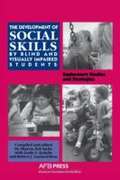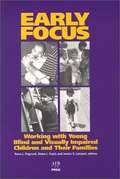Special Collections
American Foundation for the Blind
Description: American Foundation for the BlindPress offers a wide range of information for students, professionals, researchers, and blind and visually impaired people and their families. #teachers #disability
- Table View
- List View
Ability Structure and Loss of Vision
by Jyrki JuurmaaPsychological testing of the ability structures of the blind and sighted was commenced almost simultaneously during the first decades of this century. However, a majority of the studies concerning the blind, and the most crucial among them, sought to develop IQ-type test batteries, intended mainly for appraising their school achievement. By contrast, systematic studies have not been carried out to explore the relationships among different, mutually relatively independent traits and the quantitative contributions of such traits to different test performances. This lack of interest is perhaps due to the narrow range of occupations regarded as suitable for the blind: there has been no acute need for a more differentiated picture.
Access to Mass Transit for Blind and Visually Impaired Travelers
by William R. Wiener and Mark M. Uslan and Alec F. Peck and Arlene SternAccess to Mass Transit addresses travel issues vital to independence for blind and visually impaired persons from several perspectives- those of blind and visually impaired persons who use mass transit, orientation and mobility instructors, and transportation professionals. Focusing on national and international issues, this information-filled manual covers approaches to making mass transit accessible in several cities in the United States and in Canada, the United Kingdom, and Japan. Arranged in a well-illustrated, easy-to-use format, tips, techniques, guidelines, and adaptive strategies are presented for safe and independent travel on subways, buses, and commuter rails.
Adjustment to Visual Disability in Adolescence
by Emory L. Cowen and Rita P. Underberg and Ronald T. Verrillo and Frank G. BenhamThis volume describes a three-year research program in which the determination of some factors relating to adjustment in visually disabled adolescents was a prime objective.
Art Not by Eye
by Yasha LisencoThe book, in two parts, deal with avenues for adventitiously blind adult, and the blind and severely visually impaired adults in the art program.
Berthold Lowenfeld on Blindness and Blind People
by Berthold LowenfeldThis book contains articles spanning a period of almost 40 years by Dr. Berthold Lowenfeld, a creative writer in education of the visually handicapped on Blindness and Blind People.
The Blind in School and Society
by Thomas D. CutsforthThe purpose of this book is to help acquaint the seeing with the blind and the blind with themselves.
The Blind Preschool Child
by Berthold LowenfeldThis book is a collection of papers presented at the National Conference On The Blind Preschool Child on March 13-15, 1947.
Braille Literacy
by Diane P. WormsleyWormsley (program director, Professional Preparation Program in Education of Children with Visual and Multiple Disabilities, Pennsylvania College of Optometry) describes an approach to braille reading and writing instruction based on students' individual interests, needs, and goals. She offers general guidelines for a functional approach to braille literacy, then offers case studies of how the program can be modified for at-risk learners. The approach works with children and adults learning braille for the first time. B&w photos of instructional materials are included. Annotation ©2004 Book News, Inc., Portland, OR (booknews.com)
Building Blocks
by Joe Dominguez and Betty DominguezThis bilingual (English/Spanish) book comprises six chapters each of Part I & II on Early Learning and Blind and Visually Impaired Children and on Activities for Blind and Visually Impaired Preschoolers.
Business Owners Who Are Blind or Visually Impaired
by Deborah KendrickThe second title in the exciting Jobs That Matter series written by an award-winning blind journalist, Business Owners Who Are Blind or Visually Impaired demonstrates the wide range of careers and talents that can be pursued by persons with visual impairments. Each profile features a successful individual who has accomplished his or her dream of business ownership and who shares important insights. From a lawyer and an accountant to a florist and a gourmet cook, the range of engaging stories told will inspire young adults with visual impairments and the parents, teachers, and counselors who advise them.
A Celebration of Solutions
by Karen E. WolffeAlthough there has been an ever-increasing awareness of the critical need for literacy skills in the United States (Chisman, 1990; Graubard, 1991; Sum, 1999), very little attention has been focused on the special challenges inherent in providing basic literacy skills instruction to adults with visual disabilities.
Collaborative Assessment
by Stephen A. Goodman and Stuart H. WittensteinThis comprehensive text published by AFB in 2003 is the first to present assessment in a way that can be understood by professionals and families alike.
The Community of the Blind
by Yoon Hough KimDr. Kim has investigated the validity of the widely-held view that while there are a large number of blind persons whose social lives are centered in the mainstream, that is with sighted persons, there are an equally large number of blind persons whose social lives are restricted mainly to other blind persons.
Competency Based Curriculum for Teachers of the Visually Handicapped
by Susan J. SpunginThis book is a guideline for teachers of the blind. Six basic types of education system now exist, and were examined for the purposes of this study: full-time special class, resource room, itinerant program, resource room/itinerant program, teacher consultant, and residential school.
The Conquest of Blindness
by Henry Randolph LatimerThe term "Conquest of Blindness" is taken to include any preventive, remedial, educational, rehabilitating, or relief phase of work pertaining to the handicap of blindness.
The primary aim of the volume is to lift work for the conquest of blindness out of the miasma of alms and asylums into the more wholesome atmosphere of social adjustment.
Other aims of the volume are to serve as a supplementary text for the use of the profession, and as an incentive to the chance reader to delve more deeply into the subject, and to present as modestly as may be the autobiography of one blind person who has contributed in small measure toward the conquest of blindness.
Cortical Visual Impairment
by Christine Roman-LantzyCortical Visual Impairment: An Approach to Assessment and Intervention provides educators, therapists, physicians, and parents of children with CVI with an understanding of the condition and a complete framework for assessment and intervention. The new and revised content in this second edition brings the book up-to-date with new research and insights into CVI, its development and progression, and the best approaches to assessment and intervention with children affected by this condition. As in the previous edition, assessment forms, including the CVI Range and CVI Progress Chart, provide a comprehensive method for evaluating the functional vision status of, and program planning for, children with CVI.
Data on Blindness and Visual Impairment in the U. S.
by Corinne KirchnerData from a wide variety of sources cover age, gender, race and ethnicity, education, employment and income, service delivery systems, vision services, employment-related services, and income benefits program.
The Demography and Causes of Blindness
by Hyman GoldsteinA report on the statistics of blindness from an international point of view.
The Demography of Blindness Throughout the World
by Hyman GoldsteinMost of the world's blindness could be prevented, and the attack on it and its consequences proceeds apace through such organizations as the World Council for the Welfare of the Blind, the International Agency for the Prevention of Blindness, and the World Health Organization.
For greatest effectiveness, their programs must be based upon accurate data, as a WHO study quoted here by Dr. Goldstein makes clear: "In order to establish appropriate priorities for prevention and treatment at the national and international level, it is essential that reliable up-to-date statistical data on prevalence, age of onset, and causes of blindness be obtained."
But even in the United States, where collection of data on blindness began in 1830, there are still no reliable trend data. In much of the rest of the world data are fragmentary, and data that would allow valid country by country comparisons are almost non-existent.
Dr. Goldstein has done a valuable service in pulling together such statistics as can be found, and in discussing their weaknesses and strengths.
The Development of Social Skills by Blind and Visually Impaired Students
by Sharon Zell Sacks and Linda S. Kekelis and Robert J. Gaylord-RossThe book, using an ethnographic approach, outlines the theoretical background of social-skills development, presents case studies and suggests guidelines for helping Blind and Visually Impaired children shape those encounters into satisfying ones.
Diabetes, Vision Impairment, and Blindness
by Allene R. Van SonVision impairment is a common complication of diabetes mellitus, which is itself the leading cause of new cases of blindness among adults in the United States. Three percent of the country's 10 million diabetics have experienced severe vision loss as a result of the disease. This means that diabetics frequently have to face additional problems of impending loss of vision and blindness. The purpose of this pamphlet is to explain the relationship between visual impairment and diabetes and to identify recent advances in treatment and rehabilitation to help diabetics and their families deal with the problems of vision loss.
Early Focus
by Jessica S. Lambert and Diane L. Fazzi and Rona L. PogrundStressing the importance of early intervention in working with children with visual impairment, Pogrund (formerly special education, California State U.) and Fazzi (special education, California State U.) offer practitioners (teachers and other specialized professionals) an edited guide to working with children under age five. Eleven chapters review the developmental areas that are likely to be affected by vision loss and discuss the theory and knowledge base behind suggested educational practices in these areas. Chapters cover working with families, medical and functional implications, cognitive development, literacy, social development, promotion of independence and daily living skills, behavioral supports, motor and mobility development, and working with other professionals. Annotation (c)2003 Book News, Inc., Portland, OR (booknews.com)
The Effects of Blindness and Other Impairments on Early Development
by Zofja S. JastrazembskaA scientific study of blind children, where there are frequently marked delays in locomotor achievements by sighted standards.
English / Spanish Basics for Orientation and Mobility Instructors
by Christian J. FoyThis book was written as a teaching aid for orientation and mobility (O&M) instructors. Author's intention is not to teach the techniques of the profession but to supply the vocabulary instructors might use to teach students in Spanish.
Essays on Blindness Rehabilitation in Honor of Thomas J. Carroll
by John F. MuldoonThe author of the articles in this book has given us an excellent assessment of Father Carroll's concepts and the viability of those concepts today. Moreover, they have provided us with a look at the man behind the ideas.

